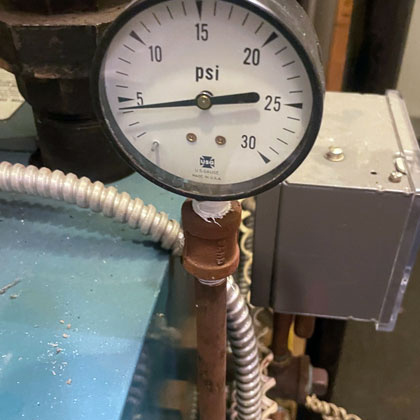How To Check Your Heating System For Leaks
A well-functioning heating system is crucial for keeping your home warm and comfortable, especially during the colder months. One of the most common issues homeowners face is a leak in their heating system. Leaks can lead to uneven heating, rising energy bills, and even damage to your home’s structure if left untreated. Regularly checking your heating system for leaks is an essential maintenance task that can save you time, money, and stress. The HVAC professionals at Oliver are here to explain how to handle this task.
Step-by-Step Instructions For Checking Your Heating System For Leaks
Step 1. Turn Off The Heating System
Before performing any inspection, ensure your heating system is completely turned off. For boilers or hot water systems, turn off the power supply and allow the system to cool down. This step is essential to avoid burns or other injuries during the inspection.
Step 2. Inspect Visible Pipes And Connections
Start by visually inspecting all exposed pipes, valves, and joints. Look for any signs of moisture, corrosion, or water stains. Pay particular attention to areas where pipes connect to radiators, the boiler, or other components. Even a small bead of water can indicate a developing leak.
Step 3. Check The Pressure Gauge (For Boilers)
If you have a boiler system, check the pressure gauge to ensure it’s within the recommended range. A sudden drop in pressure could indicate a leak in the system. If you notice consistent pressure drops, it’s a sign that further investigation is needed.
Step 4. Use A Leak Detection Solution
To identify smaller or hidden leaks, apply a leak detection solution to joints and fittings. If using soapy water, brush it onto the area and watch for bubbles. Bubbling indicates escaping air or water, pinpointing the location of the leak.
Step 5. Listen For Unusual Sounds
While your heating system is running, listen carefully for any hissing, dripping, or banging noises. These sounds can indicate a leak or an issue with air trapped in the system.
Step 6. Inspect Radiators And Baseboards
Check each radiator or baseboard unit for damp spots, rust, or corrosion. Even a minor leak at the radiator valve can lead to larger problems if ignored. Tighten any loose fittings gently, but avoid overtightening, which can damage the connection.
Step 7. Examine The Boiler Or Furnace Area
Inspect around the boiler or furnace for water pooling or signs of rust. Pay attention to the pressure relief valve and any nearby pipes, as these are common sources of leaks.
Step 8. Tighten Loose Connections
If you find a minor leak at a connection, you may be able to tighten it slightly using an adjustable wrench. For threaded connections, applying Teflon tape or pipe sealant can help create a watertight seal.
Step 9. Monitor The System After Repairs
After tightening connections or applying sealant, turn your heating system back on and monitor it closely. Recheck pressure levels and inspect all areas previously showing moisture. Ensure there are no new leaks forming.
Step 10. Know When To Call A Professional
Some leaks, especially in boilers or hidden pipes, can be difficult or dangerous to fix without professional expertise. If you notice persistent leaks, pressure drops, or corrosion that cannot be addressed with minor adjustments, it’s best to call a licensed heating professional, like our pros at Oliver.
The Benefits Of Regular Leak Inspections
Regularly checking your heating system for leaks provides several important benefits. It helps prevent water damage to floors, walls, and ceilings, maintains consistent heating throughout your home, and reduces energy bills by ensuring the system runs efficiently. Routine inspections can extend the lifespan of your heating system by preventing corrosion and wear. By proactively identifying small issues, you can address them before they develop into costly repairs.

Tools Needed
- Flashlight
- Adjustable wrench
- Screwdriver set
- Bucket or towels (for catching any minor leaks)
- Pipe sealant or Teflon tape
- Leak detection solution (soapy water works fine)
- Protective gloves
- Pressure gauge (optional but recommended for boilers)
Hire The Professionals At Oliver For Your Heating Needs
While some minor leaks can be addressed by homeowners, many heating system issues require professional attention. Our skilled team at Oliver has years of experience inspecting, repairing, and maintaining heating systems. From small leaks to complex boiler problems, our experts ensure your home stays warm and safe all year long. Don’t wait for a minor leak to turn into a major headache. Call Oliver at (888) 810-2681 today to schedule a professional heating system inspection and protect your home.



